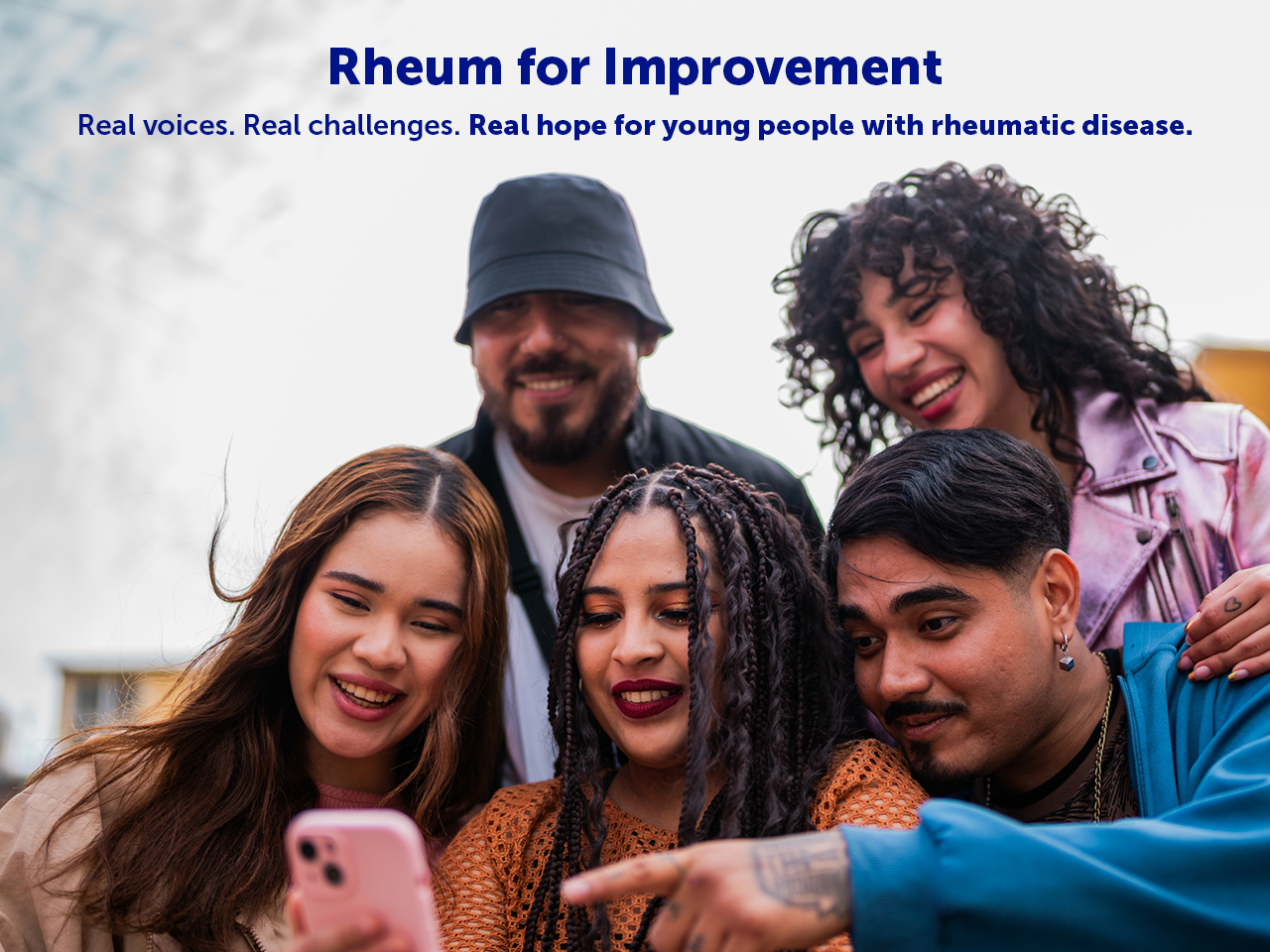
Living with a chronic rheumatic disease like psoriatic arthritis (PsA), non-radiographic axial spondyloarthritis (nr-axSpA), or ankylosing spondylitis (AS) can be physically debilitating and make everyday activities—such as getting ready, playing sports, or planning a career—challenging.1-2
People living with these diseases also face invisible symptoms, such as chronic fatigue, depression, and anxiety.3-4 As part of our ongoing commitment to understanding unmet needs within the rheumatology community, UCB recently conducted a “Rheum for Improvement” survey.* Because the average age of onset is between 30 to 50 years for PsA5 and 26 years for axSpA6, the survey focused on 250 Generation (Gen) Z (born 1997-2008) and Millennial (born 1981-1996) patients with PsA or axSpA, which includes both nr-axSpA and AS.7
Chronic Fatigue Cannot Be Overlooked
While physical symptoms of PsA and axSpA—such as pain and stiffness—can limit daily activities, the survey revealed that fatigue can also be debilitating.1,7-8 In fact, 60% (n=30) of the 50 AS and nr-axSpA patients surveyed and 36% (n=72) of the 200 PsA patients surveyed report chronic fatigue as a pressing unmet need.7 Gen Z and Millennials diagnosed with rheumatic diseases may be managing chronic fatigue during one of the busiest periods of their lives––the time many people spend focused on career goals and family planning.9-10
Prioritizing Patients in the Exam Room
People with PsA, nr-axSpA, and AS can also face significant challenges with diagnostic delays.8,11 Survey results showed that nearly 42% (n=21) of the 50 AS and nr-axSpA patients surveyed reported a need for greater awareness among HCPs in order to reduce diagnosis delays.7 Similarly, 24% (n=48) of the 200 PsA patients reported improved screening and diagnostic tools as an unmet need.7
Many of the 250 people surveyed emphasized a desire to express their own needs and experiences in conversations with their HCPs.7 Encouraging results showed that despite diagnostic delays and the visible and invisible limitations, more than half of the 34 Gen Z and 216 Millennial survey respondents living with axSpA (56%; n=28) and PsA (67%; n=134) felt empowered to engage in shared decisions around their care.7
The Importance of Connectivity
The survey also revealed that family and community support are crucial for those living with chronic rheumatic diseases.7 While many of the 34 Gen Z (74%; n=25) and 216 Millennial (67%; n=145) participants surveyed reported being open to discussing their conditions with loved ones, they may feel misunderstood after discussing their disease and symptoms with loved ones.7 These findings demonstrate the need for continued awareness around these conditions, and tools to encourage open conversations and education for family, friends, and all those who are impacted by rheumatic disease.
A Bright Future Ahead
The results showing us these areas where there is “Rheum for Improvement” within the management and support of Gen Z and Millennial patients living with PSA, nr-axSpA, and AS, provide us valuable insights that deepen our understanding of the patient journey. UCB is committed to acting on these insights not only to raise the standard of care across rheumatology but also to ensure our solutions go beyond medicines alone to address unmet needs.
*The survey was fielded April 16–29, 2025, and included 200 people with PsA, 40 with AS, and 10 with nr-axSpA.
References
- James L, Hailey LH, Suribhatla R, McGagh D, et al. The impact of psoriatic arthritis on quality of life: a systematic review. Ther Adv Musculoskelet Dis. 2024;16:1759720X241295920. doi:
10.1177/1759720X241295920. - Berr, K, Ziehfreund, S, Welcker, M, et al. A qualitative exploration of the patient journey in axial spondyloarthritis towards a people-centered understanding. Sci Rep. 2024;14(19977).
https://doi.org/10.1038/s41598-024-70420-8. - Strand V, Singh JA. Patient Burden of Axial Spondyloarthritis. J Clin Rheumatol. 2017;23:383-391.
- McDonough E, Ayearst R, Eder L, et al. Depression and anxiety in psoriatic disease: prevalence and associated factors. J Rheumatol. 2014;41(5):887–896.
https://pubmed.ncbi.nlm.nih.gov/24692521/. - Gladman DD, et al. Psoriatic arthritis: epidemiology, clinical features, course, and outcome. Ann Rheum Dis. 2005;64 Suppl 2(Suppl 2):ii14–ii17. https://pubmed.ncbi.nlm.nih.gov/15708928/
- Garrido-Cumbrera M, Navarro-Compán V, Bundy C, et al. EMAS Working Group. Identifying parameters associated with delayed diagnosis in axial spondyloarthritis: data from the European map of axial spondyloarthritis. Rheumatology (Oxford). 2022;61(2):705-712. doi:
10.1093/rheumatology/keab369. - Data on file. UCB, Inc., Smyrna, GA. Rheum for Improvement Survey (n=250).
- Deodhar A. Understanding Axial Spondyloarthritis: A Primer for Managed Care. Am J Manag Care. 2019;25:S319-30.
- Mehta, C. Speaking of Psychology: The ‘rush hour’ of life: Navigating your 30s and 40s, with Clare Mehta, PhD. American Psychological Association. https://www.apa.org/news/podcasts/speaking-of-psychology/establishedadulthood#:~:text=Between%20raising%20young%20children%2C%20climbing%20the%20car eer%20ladder%20and%20handling,be%20a%20particularly%20busy%20time.
- Festini SB, Hertzog C, McDonough IM, Park DC. What makes us busy? Predictors of perceived busyness across the adult lifespan. J Gen Psychol. 2019 Apr-Jun;146(2):111-133. doi:1080/00221309.2018.1540396.
- Kavanaugh A, Helliwell P, Ritchlin CT. Psoriatic arthritis and burden of disease: patient perspectives from the population-based multi national assessment of psoriasis and psoriatic arthritis (MAPP) survey. Rheumatol Ther. 2016;3(1):91–102.
©2025 UCB, Inc., Smyrna, GA 30080. All rights reserved. US-BK-2500378
Choose a Country
- Global Site – English
- Australia – English
- België – Engels
- Belgique – Anglais
- Brasil – Português
- България – Български
- Canada – English
- Canada – Français
- 中国 – 中文
- Česká Republika – Angličtina
- Danmark – Engelsk
- Deutschland – Deutsch
- France – Français
- España – Español
- Ελλάδα – Ελληνικά
- India – English
- Ireland – English
- Italia – Inglese
- 日本 – 日本語
- Казахстан – ағылшын тілі
- 한국 – 한국어
- Luxembourg – Anglais
- Luxemburg – Engels
- Magyarország – Angol
- México & Latinoamérica – Español
- Nederland – Engels
- New Zeeland – English
- Norge – Engelsk
- Österreich – Deutsch
- Polska – Polski
- Portugal – Inglês
- România – Engleză
- Россия – Русский
- Slovensko – Anglický
- Suomi – Englanti
- Sverige – Engelska
- Schweiz – Deutsch
- Suisse – Français
- Türkiye – Türkçe
- Україна – Англійська
- United Kingdom – English
- U.S.A. – English